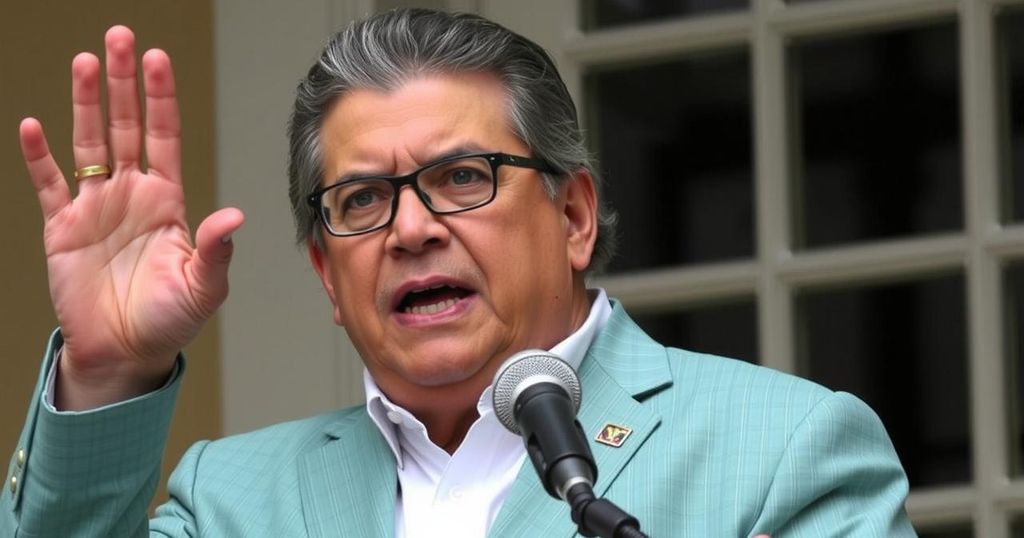World news
AMERICA, ARGENTINA, ASIA, BRAZIL, COLOMBIA, CORRUPTION, CUBA, DEMOCRACY, DONALD TRUMP, ECUADOR, JOE BIDEN, LATIN AMERICA, MADURO, MEXICO, MIGUEL DÍAZ - CANEL, MIGUEL DIAZ - CANEL, NORTH AMERICA, PANAMA, PERU, PHILIPPINES, POLITICS, SOUTH AMERICA, THE WASHINGTON POST, TRADE RELATIONS, UNITED STATES, VENEZUELA, WASHINGTON, WASHINGTON OFFICE, WASHINGTON POST
Michael Grant
0 Comments
Maduro Sworn Into Office Amidst Claims of Electoral Fraud and Opposition Claims of Victory
Nicolás Maduro was sworn in as Venezuela’s president despite allegations of electoral fraud. The opposition claims their candidate, González, won the election based on substantial evidence. The election has been cited as possibly the largest electoral fraud in Latin America’s recent history. The recognition of González by various countries adds to the complexities of Venezuela’s political situation, raising questions about the international community’s response.
Nicolás Maduro was sworn in for a third term as president of Venezuela on Friday, a position he has maintained for more than a decade despite facing allegations of electoral fraud. This inauguration marks the first instance where the opposition has gathered substantial evidence suggesting their candidate, González, won decisively against Maduro. Observers have characterized the elections as possibly the most significant electoral fraud in recent Latin American history, backing the opposition’s claims with documented receipts from voting centers, indicating González’s overwhelming victory.
The situation in Venezuela not only reflects the complexity of its internal politics but also sets a troubling standard for other democracies in the region, as asserted by Carolina Jiménez Sandoval, president of the Washington Office on Latin America. She emphasized, “In the 21st century, an important country in Latin America can disregard the will and sovereignty of the people and remain in a de facto government.”
In light of the prevailing political tensions, representatives from several nations, including the United States, have acknowledged González as the legitimate president-elect. Meanwhile, Maduro’s administration intensified its control by closing borders and deploying military assets ahead of the inauguration. Adding to this volatility, world leaders from neighboring countries refrained from attending Maduro’s swearing-in ceremony, signaling widespread non-recognition of his mandate.
As international relations unfold, it remains uncertain how the Biden administration or other world powers will navigate their stance with Maduro, particularly after trying to engage with him through sanctions relief in exchange for electoral promises—a deal that ultimately failed. Meanwhile, the opposition’s resilience illustrated by grassroots mobilization led to the collection of credible evidence supporting González’s triumph, thus demanding a reconsideration of Venezuela’s political future in the face of increasing authoritarianism.
Nicolás Maduro has held the presidency of Venezuela for over ten years amidst allegations of authoritarian governance and electoral fraud. His recent inauguration follows a contested election where he claimed victory without substantial evidence. The opposition, led by González, challenges this narrative, bolstered by evidence that suggests widespread electoral misconduct. This dynamic has far-reaching implications not only for Venezuela but for democratic norms across Latin America. International reactions have varied, with some countries formally recognizing González as the rightful president-elect. Observers have pointed out Venezuela’s current situation as a dangerous precedent for democracy, indicating a growing trend of electoral manipulation and civil rights violations. Furthermore, the geopolitical context surrounding Maduro’s administration, particularly in relation to the United States and regional players, complicates the prospect of political resolution.
In conclusion, Nicolás Maduro’s inauguration as president underscores the deepening crisis of legitimacy in Venezuela, with significant implications for regional stability and democracy. The clear divide between the Maduro administration and the opposition, marked by González’s claims of electoral victory, emphasizes the urgent need for international scrutiny and potential intervention. The response from global leaders will be crucial in determining the future of democracy in Venezuela and its impact on Latin America as a whole.
Original Source: www.washingtonpost.com




Post Comment